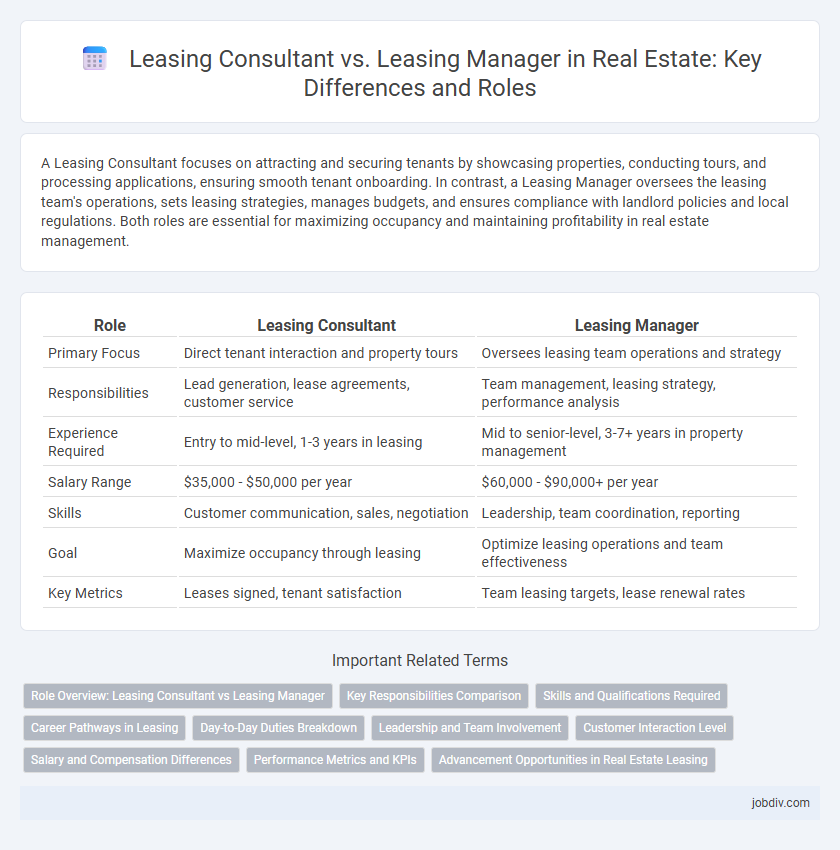A Leasing Consultant focuses on attracting and securing tenants by showcasing properties, conducting tours, and processing applications, ensuring smooth tenant onboarding. In contrast, a Leasing Manager oversees the leasing team's operations, sets leasing strategies, manages budgets, and ensures compliance with landlord policies and local regulations. Both roles are essential for maximizing occupancy and maintaining profitability in real estate management.
Table of Comparison
| Role | Leasing Consultant | Leasing Manager |
|---|---|---|
| Primary Focus | Direct tenant interaction and property tours | Oversees leasing team operations and strategy |
| Responsibilities | Lead generation, lease agreements, customer service | Team management, leasing strategy, performance analysis |
| Experience Required | Entry to mid-level, 1-3 years in leasing | Mid to senior-level, 3-7+ years in property management |
| Salary Range | $35,000 - $50,000 per year | $60,000 - $90,000+ per year |
| Skills | Customer communication, sales, negotiation | Leadership, team coordination, reporting |
| Goal | Maximize occupancy through leasing | Optimize leasing operations and team effectiveness |
| Key Metrics | Leases signed, tenant satisfaction | Team leasing targets, lease renewal rates |
Role Overview: Leasing Consultant vs Leasing Manager
A Leasing Consultant primarily handles tenant interactions, property showings, and lease agreement processing, focusing on day-to-day leasing operations. A Leasing Manager oversees the leasing team, develops strategic marketing plans, analyzes leasing performance metrics, and ensures compliance with property management policies. The Leasing Manager's role involves leadership and operational oversight, while the Leasing Consultant emphasizes direct customer service and lease facilitation.
Key Responsibilities Comparison
Leasing Consultants primarily handle tenant inquiries, conduct property tours, and process rental applications to ensure high occupancy rates. Leasing Managers oversee leasing teams, develop marketing strategies, and analyze market trends to drive revenue growth and optimize lease agreements. Both roles collaborate closely, but managers focus on strategic planning and team leadership while consultants engage directly with prospective tenants.
Skills and Qualifications Required
Leasing Consultants require strong communication and customer service skills, along with knowledge of property management software and local rental laws. Leasing Managers need advanced leadership abilities, experience in team management, and proficiency in budgeting, marketing strategies, and lease negotiation. Both roles benefit from a deep understanding of real estate market trends and tenant relations to optimize occupancy rates.
Career Pathways in Leasing
Leasing Consultants typically start their careers by assisting clients with property tours, lease applications, and rental agreements, developing strong customer service and sales skills essential for advancement. Progressing to a Leasing Manager role involves overseeing leasing teams, managing property occupancy rates, and implementing marketing strategies, which requires leadership experience and a deep understanding of property management. Career pathways in leasing often move from hands-on client interactions to strategic oversight, with opportunities to specialize in commercial or residential properties, enhancing expertise and earning potential.
Day-to-Day Duties Breakdown
Leasing Consultants primarily handle tenant interactions, property showings, lease agreements, and prospect follow-ups to secure occupancy. Leasing Managers oversee leasing teams, manage marketing strategies, analyze occupancy rates, and coordinate property maintenance to optimize tenant satisfaction and revenue. Their day-to-day duties differ in scope, with consultants focusing on direct leasing activities and managers responsible for operational leadership and performance metrics.
Leadership and Team Involvement
Leasing Managers oversee leasing teams, providing strategic leadership and ensuring alignment with company goals through performance management and training initiatives. Leasing Consultants focus on direct tenant interactions, executing leasing strategies, and supporting team efforts to maximize occupancy and resident satisfaction. Effective leadership in real estate requires Leasing Managers to foster collaboration and motivate Leasing Consultants, enhancing overall team productivity and leasing success.
Customer Interaction Level
Leasing Consultants engage directly with prospective tenants, providing personalized tours, answering detailed questions, and facilitating the application process to ensure a positive leasing experience. Leasing Managers typically oversee these interactions by training staff and resolving complex customer issues, focusing more on strategy than day-to-day tenant communication. High-quality customer interaction is critical at the consultant level to drive occupancy rates and resident satisfaction.
Salary and Compensation Differences
Leasing Managers typically earn higher salaries than Leasing Consultants due to greater responsibilities such as overseeing leasing teams and managing property portfolios, with average annual salaries ranging from $55,000 to $80,000 compared to $35,000 to $50,000 for Leasing Consultants. Compensation for Leasing Managers often includes bonuses and profit-sharing tied to property performance, while Leasing Consultants may receive commissions based primarily on individual leases signed. Salary variations depend on factors like geographic location, property size, and company compensation structures within the real estate industry.
Performance Metrics and KPIs
Leasing Consultants are typically evaluated based on lead conversion rates, number of lease applications processed, and tenant satisfaction scores, emphasizing direct interaction with prospective tenants and occupancy rates. Leasing Managers focus on higher-level performance metrics such as overall portfolio occupancy, lease renewal rates, revenue growth, and team productivity, reflecting their role in strategy and team leadership. Key performance indicators for Leasing Managers also include budget adherence, marketing effectiveness, and employee retention within the leasing department.
Advancement Opportunities in Real Estate Leasing
Leasing Consultants often begin their careers by gaining direct experience with tenant relations and property tours, positioning themselves for advancement to Leasing Manager roles that oversee multiple properties and teams. Leasing Managers typically assume higher-level responsibilities such as strategic leasing plans, team leadership, and performance analytics, which open pathways to senior management positions like Regional Manager or Director of Leasing. The progression from Leasing Consultant to Leasing Manager reflects crucial skill development in negotiation, marketing, and operational management, essential for long-term success in real estate leasing careers.
Leasing Consultant vs Leasing Manager Infographic

 jobdiv.com
jobdiv.com